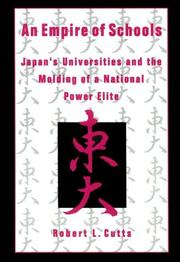| Listing 1 - 3 of 3 |
Sort by
|
Book
ISBN: 0674471857 9780674471856 Year: 1972 Volume: 70 Publisher: Cambridge (Mass.): Harvard university press,
Abstract | Keywords | Export | Availability | Bookmark
 Loading...
Loading...Choose an application
- Reference Manager
- EndNote
- RefWorks (Direct export to RefWorks)
College students --- Political activity --- Shinjinkai (Tōkyō Teikoku Daigaku) --- J4010 --- J4000.90 --- J4165 --- -College life --- Universities and colleges --- University students --- Students --- Japan: Social sciences in general -- ideology, socio-political and socio-economic movements --- Japan: Social history, history of civilization -- postwar Shōwa (1945- ), Heisei period (1989- ), contemporary --- Japan: Sociology and anthropology -- communities, social classes and groups -- scholars, students, intellectuals --- Education --- Shinjinkai --- Shinjinkai (Tokyo Teikoku Daigaku) --- Tōkyō Teidai Shinjinkai --- New Man Society (Tōkyō Teikoku Daigaku) --- Tōdai Shinjinkai --- Teidai Shinjinkai (Tōkyō Teikoku Daigaku) --- 新人会 (東京帝國大学) --- 新人会 (Tōkyō Teikoku Daigaku) --- 新人会東 (京帝国大学) --- 新人会 --- 新人會 --- -Japan: Social sciences in general -- ideology, socio-political and socio-economic movements --- College students - Political activity - Japan
Book
ISBN: 9780742568150 9780742568136 Year: 2010 Publisher: Lanham Rowman & Littlefield
Abstract | Keywords | Export | Availability | Bookmark
 Loading...
Loading...Choose an application
- Reference Manager
- EndNote
- RefWorks (Direct export to RefWorks)
One of Japan's most important intellectuals, Nambara Shigeru defended Tokyo Imperial University against its rightist critics and opposed Japan's war. His poetic diary (1936–1945), published only after the war, documents his profound disaffection. In 1945 Nambara became president of Tokyo University and was an eloquent and ardent spokesman for academic freedom. Among his most impressive speeches are two memorials to fallen student-soldiers, which directly confront Nambara's wartime dilemma: what and how to advise students called up to fight a war he did not believe in. In this first English-language collection of his key work, historian and translator Richard H. Minear introduces Nambara's career and thinking before presenting translations of the most important of Nambara's essays, poems, and speeches. A courageous but lonely voice of conscience, Nambara is one of the few mid-century Japanese to whom we can turn for inspiration during that dark period in world history.
Intellectuals --- Dissenters --- World War, 1939-1945 --- War and society --- Education, Higher --- History --- Philosophy --- Nanbara, Shigeru, --- Tōkyō Teikoku Daigaku --- Tōkyō Daigaku --- Faculty --- Presidents --- Japan

ISBN: 1563248433 Year: 1997 Publisher: Armonk, N.Y. : M.E. Sharpe,
Abstract | Keywords | Export | Availability | Bookmark
 Loading...
Loading...Choose an application
- Reference Manager
- EndNote
- RefWorks (Direct export to RefWorks)
Education, Higher --- Elite (Social sciences) --- Nationalism and education --- Enseignement supérieur --- Elite (Sciences sociales) --- Nationalisme et éducation --- Social aspects --- Case studies --- Case studies. --- Aspect social --- Cas, Etudes de --- Tokyo Daigaku --- -Elite (Social sciences) --- -Nationalism and education --- -J4965 --- J4201 --- J4900 --- J4935 --- 378.4 <520> --- 378.18 <520> --- Education and nationalism --- Nationalism in education --- Education --- Elites (Social sciences) --- Leadership --- Power (Social sciences) --- Social classes --- Social groups --- College students --- Higher education --- Postsecondary education --- Universities and colleges --- -Case studies --- Japan: Education -- higher education --- Japan: Sociology and anthropology -- communities -- social classes and groups -- upper class, elite --- Japan: Education -- general and history --- Japan: Education -- educational psychology and sociology --- Universiteiten--Japan --- Studenten: statuut. Maatschappelijke problemen van studenten--Japan --- 378.4 <520> Universiteiten--Japan --- Enseignement supérieur --- Nationalisme et éducation --- Tōkyō Daigaku --- J4965 --- Social aspects&delete& --- Tōkyō Daigaku. --- Tokyo University --- University of Tokyo --- Universidad de Tokyo --- Universidad de Tokio --- Todai --- Univ. Tokyo --- Université de Tōkyō --- 束京大学 --- 東京大学 --- 東京大學 --- Tōkyō Teikoku Daigaku
| Listing 1 - 3 of 3 |
Sort by
|

 Search
Search Feedback
Feedback About UniCat
About UniCat  Help
Help News
News